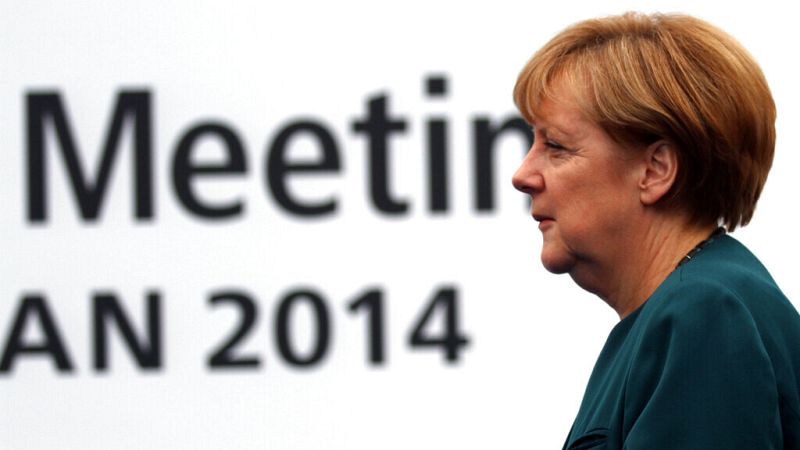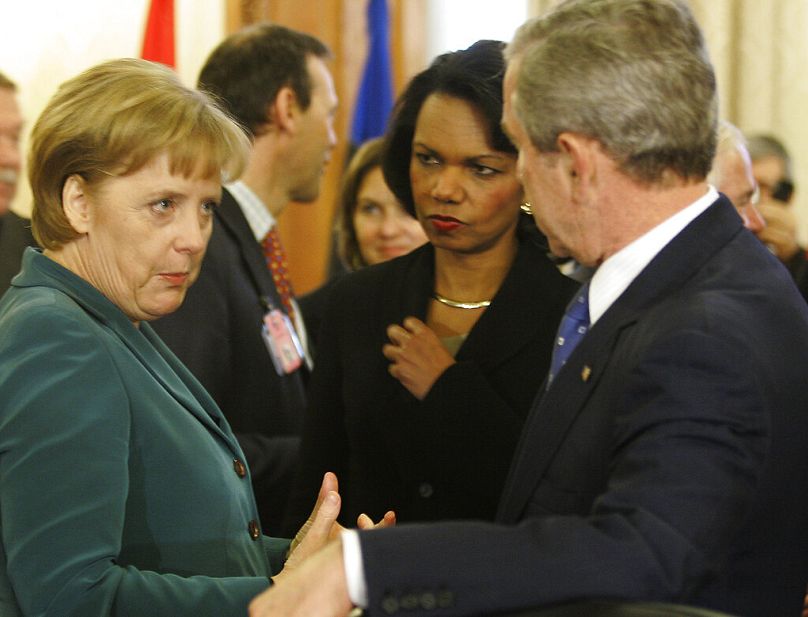Angela Merkel delayed Ukraine's NATO bid over Russia fears, memoir reveals

Former German Chancellor Angela Merkel has justified her efforts to delay Ukraine's bid for NATO membership during her time in office, citing fears that Russia could retaliate, according to excerpts from her upcoming memoir published in German weekly Die Zeit.
Merkel, who was German chancellor for 16 years, described her hesitation over supporting Ukraine's Membership Action Plan, or MAP status, for joining NATO at a key summit in Bucharest in 2008, where membership for the country was eventually halted.
In her memoir, Merkel said she felt that Ukraine's desire to join NATO should be balanced with security concerns for the military alliance as a whole. She wrote of her concern about Ukraine's ties to Russia, especially the Russian Black Sea fleet based in the Ukrainian peninsula of Crimea, which Moscow later illegally annexed in 2014.
Merkel said she thought it was an "illusion" that MAP status for Ukraine would protect the country from Russian President Vladimir Putin, or that it would have acted as a deterrent for Putin, who she described as someone "always ready to dish out punishment" and uninterested in building "democratic structures."
Merkel also said that only a minority of those in Ukraine supported its push for NATO membership at the time, before concluding she was "convinced" she could not then agree to Ukraine joining the military alliance.
Nevertheless, the German leader said that not offering Ukraine a clear MAP into the military alliance had costs for the country's aspirations and that a broader promise for future membership made at the 2008 summit was a provocation for Putin.
Merkel wrote that it was perceived as a "declaration of war" by the Russian leader, who reportedly told her in another context: "You will not be chancellor forever. And then they (Ukraine and Georgia) will become NATO members. And I want to prevent that."
Putin, who launched a full-scale invasion of Ukraine in 2022, has repeatedly justified his war as a response to NATO expanding along Russia's border.
While Ukraine was technically promised future NATO membership at the 2008 summit, no clear path was laid out for its ascension. Following Russia's full-scale invasion, Ukraine reiterated its request for NATO membership in September 2022. The alliance has said Kyiv's path to the alliance is irreversible, but has not put a timeline on its membership.
Separately, Merkel has faced criticism in Kyiv for Germany's approach to Russia during her tenure, including by Ukrainian President Volodymyr Zelenskyy. He has accused Berlin of being too friendly to Moscow, particularly over its reliance on cheap Russian gas.
The former German leader, who has largely retreated from public life since leaving office, said in an interview in 2022 that she "wouldn't apologise" for Germany's policies on Ukraine and Russia during her tenure.
Pope Francis told Merkel 'bend, don't break' over Trump
In her memoir, Merkel also revealed how she turned to Pope Francis for advice on how to manage negotiations over the Paris climate agreement with Donald Trump after he was first elected US president in 2017.
Merkel wrote that she indirectly asked Pope Francis during a private audience on how best to deal with Trump, who was then threatening to pull the US out of the agreement.
"Bend, bend, bend, but be careful that it doesn't break," he told Merkel, according to her account. Merkel wrote that she liked the image and resolved to using it during a then-upcoming G20 meeting in Hamburg.
Reflecting on a meeting with Trump at the White House in March 2017, Merkel said that Trump "judged everything from the perspective of the real estate entrepreneur he had been before politics". Trump spoke on an "emotional level" while she was "factual", and he appeared fascinated by Putin and other authoritarian leaders, Merkel recounted.
She noted that Trump had repeatedly criticised her and Germany during his election campaign, and that he had ignored her subtle requests for a second handshake in front of reporters during that 2017 White House visit — a trip she had planned "meticously".
"A solution to the problems raised did not seem to be his goal," she said in reference to Trump's complaints that Germany was engaging in unfair trade practices and spending too little on defence. However, Merkel admitted that Germany's inability to hit NATO defence spending targets set out at a summit in 2014 was a "weak point" for Berlin.
Merkel's book — "Freedom: Memoirs 1954 - 2021" — will be released on 26 November.
Today


